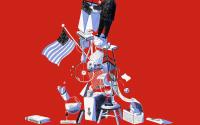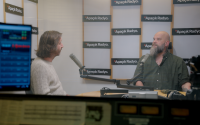 George Tenet has been under enormous pressure |
4 June 2004Nick Childs and Adam Brookes
Originally a Democrat appointee, in some ways it's a surprise that he lasted as long in the job as he has.
He had been under enormous pressure. And yet many in Washington, including within the CIA, are puzzled over the timing of his departure.
Of course, he faced political flak for the CIA's performance both over the 11 September 2001 attacks and the pre-war intelligence on Iraq.
More recently, there have been new disputes over the former Iraqi exile, Ahmad Chalabi - for his supposed role in building the case against Iraq and for alleged leaks of US intelligence to Iran.
There are two reports pending from the 11 September commission and from the Senate Intelligence Committee, both of which are expected to be highly critical of the CIA.
But this resignation now hardly comes at a good time for the Bush administration, and Mr Tenet must have known this.
Personal and political
On the face of it, the White House seems to have been taken by surprise.
It certainly protests that the CIA director wasn't pushed, and there are no indications that he was.
One source with links to the intelligence community said, "We can't see any marks on his back."
Mr Tenet indeed did have personal reasons for stepping down, not least his health. He has a history of heart problems.
 "He has been a strong and able leader at the agency. He's been a strong leader in the war on terror, and I will miss him." President George Bush |
He was close personally to President Bush, and he has been popular and well regarded within the CIA.
He had won credit for the strategy which toppled the Taleban in Afghanistan. But the ties between the CIA and the White House have been strained more recently.
But sources close to the intelligence agencies also point to political reasons for his departure.
He had lost the confidence of many in Congress, they say.
And it was not just among President Bush's Democratic critics. Some in the president's own party also criticised Mr Tenet.
"There were more failures of intelligence on his watch as director of the CIA than any other in our history," said Alabama Republican Senator Richard Shelby.
"I have long felt that, while an honourable man, he lacked the critical leadership necessary for our intelligence community to effectively operate, particularly in the post 9/11 world," he added.
And the spies face a long hot summer.
The inquiry into the 11 September attacks is due to report soon, and it will likely savage the CIA for failing to stop Osama bin Laden.
Another inquiry is investigating what the spies told the president about Saddam's elusive weapons of mass destruction as a rationale for the war.
Power struggle
And critics say he did not do enough to transform the CIA from a Cold War organization before 11 September.
And others said that he had lost out in what has seemed at times like a power struggle over intelligence with the Pentagon.
US Defence Secretary Donald Rumsfeld has always denied such a power struggle and has insisted that he and George Tenet have had a good working relationship.
Still, Mr Tenet's departure may encourage those who are arguing that the US intelligence community needs a complete overhaul, perhaps even with a new figure or post in overall charge.
Mr Tenet's post holds the title Director of Central Intelligence, and he is meant to be the President's chief intelligence adviser.
Yet the CIA is dwarfed in size and budget by the National Security Agency, or NSA, which looks after the US electronic eavesdropping intelligence.
Political fallout
But, again the timing of all this is not good.
Getting a new CIA director confirmed by Congress with a presidential election campaign well under way will be difficult, let alone pushing through major reform of US intelligence.
Both may have to wait until next January at the earliest.
But as politically damaging stories come tumbling out, there will be demands for accountability.
Mr Tenet's departure, say intelligence sources, pre-empts those demands and takes some pressure off of the Bush administration.
So ends the long, secret career of George Tenet - not with a bang, but with a whimper.






